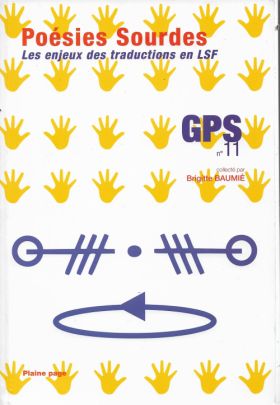
Henri Gaillard wrote an article about Louise in the Gazette des Sourds Muets, "The Work of the Deaf-Speaking", February 1917. Another article is "The archives of the deaf community in Paris, what possibilities for a broader perspective? " by Yann Cantin. Use interlibrary loan to request these articles.
 Biographical Dictionary of the Great Deaf in France
by
Order through interlibrary loan. Publisher is Archives and Culture, 2017, and the information is on p 302. Available for purchase via https://www.archivesetculture.org/product-page/dictionnaire-biographique-des-grands-sourds-en-france
Biographical Dictionary of the Great Deaf in France
by
Order through interlibrary loan. Publisher is Archives and Culture, 2017, and the information is on p 302. Available for purchase via https://www.archivesetculture.org/product-page/dictionnaire-biographique-des-grands-sourds-en-france
 Deaf poems: history, creations, translations (GPS n ° 11 Poésies Sourdes)
Deaf poems: history, creations, translations (GPS n ° 11 Poésies Sourdes)
 The deaf community of the Belle Époque (1870-1920)
by
For the past forty years, sociological studies on minorities have multiplied. Deaf Studies bring a new perspective on the deaf, and above all a completely new angle of analysis on the question of deafness, that of the existence and development of a real community, which goes far beyond the simple hearing impairment.
The chronology usually used for these studies is based on four pivotal dates:
- 1759-1760, when the Abbé de l'Épée, initiator of free education for deaf children, structures the deaf educational landscape;
- 1834, which marks with Ferdinand Berthier the beginning of the deaf militant movement. This second period, too idealized, called the Golden Age, runs from 1834 to 1880;
- 1880, from which the teaching of sign language disappears, dark period little studied
- 1970-2005, period known as the “Deaf Awakening”, cultural renewal of the deaf community. However, the absence of in-depth work on the Belle Époque prevents a detailed understanding of the transformations. This book therefore studies this pivotal period between the emergence of the community and the era of struggles. It allows us to better understand the evolutions of this community, its internal structure, its members, and what it left to later generations.
https://www.archivesetculture.org/product-page/la-communaut%C3%A9-sourde-de-la-belle-%C3%A9poque-1870-1920
The deaf community of the Belle Époque (1870-1920)
by
For the past forty years, sociological studies on minorities have multiplied. Deaf Studies bring a new perspective on the deaf, and above all a completely new angle of analysis on the question of deafness, that of the existence and development of a real community, which goes far beyond the simple hearing impairment.
The chronology usually used for these studies is based on four pivotal dates:
- 1759-1760, when the Abbé de l'Épée, initiator of free education for deaf children, structures the deaf educational landscape;
- 1834, which marks with Ferdinand Berthier the beginning of the deaf militant movement. This second period, too idealized, called the Golden Age, runs from 1834 to 1880;
- 1880, from which the teaching of sign language disappears, dark period little studied
- 1970-2005, period known as the “Deaf Awakening”, cultural renewal of the deaf community. However, the absence of in-depth work on the Belle Époque prevents a detailed understanding of the transformations. This book therefore studies this pivotal period between the emergence of the community and the era of struggles. It allows us to better understand the evolutions of this community, its internal structure, its members, and what it left to later generations.
https://www.archivesetculture.org/product-page/la-communaut%C3%A9-sourde-de-la-belle-%C3%A9poque-1870-1920
 Les Sourds-Muets de la Belle Epoque, une communauté en mutation
by
Les Sourds-Muets de la Belle Epoque, une communauté en mutation
by